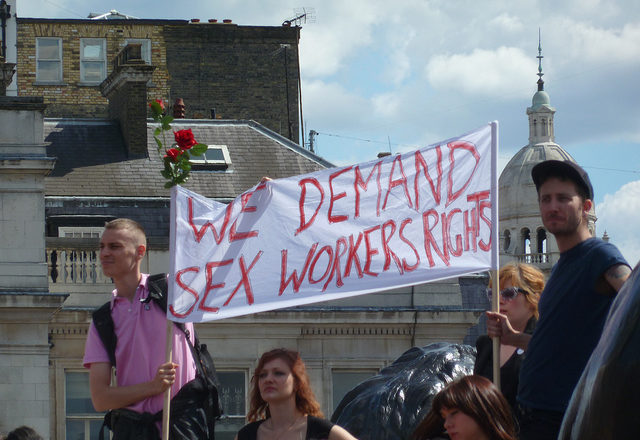
Sex work occupies a unique and often contentious space in the realms of labour law and human rights. Considerable social stigma frames the idea that sex work is not real work, not proper work, or not work at all. As such, sex workers are often not afforded human rights protections or representation in an industrial relations context. There is a direct causal link between laws that criminalise sex work, both directly and indirectly, and increased vulnerability of sex workers to human rights abuses and labour exploitation.
As Zahra Stardust has noted:
“Sex worker human rights are intrinsically linked to sex workers’ ability to negotiate with clients, and to access essential services and satisfactory workplace conditions. And yet sex industry legislation routinely violates sex workers’ basic human, civil and industrial rights.”
As a signatory to the 2011 United Nations Political Declaration (UNPD) on HIV and AIDS, Australia has made a commitment to eliminate stigma and discrimination, and to protect human rights for people living with HIV, and priority populations including sex workers. Signatories are urged to do this by “intensify[ing] national efforts to create enabling legal, social and policy frameworks”. The declaration also obliges Australia to take action on these commitments as a “critical element in combating the global HIV epidemic”.
Eight key human rights for sex workers were identified in the 2013 Global Network of Sex Work Projects (NSWP) report on sex work human rights and the law. These were: the right to associate and organise, the right to be protected by the law, the right to be free from violence, the right to be free from discrimination, the right to privacy and freedom from arbitrary interference, the right to health, the right to move and migrate, and the right to work and free choice of employment. In many parts of Australia and our region, there are laws that create barriers to sex workers working safely and enjoying the same human rights at work as a person in any other occupation.
The Australian Human Rights Commission acknowledges that Australia’s obligations regarding the right to work and rights at work come from a number of Conventions, in addition to domestic labour laws. The Universal Declaration of Human Rights, Article 23, provides that everyone has the right to work, to free choice of employment, to just and favourable conditions of work, and to protection against unemployment. Supplementary to this, the International Labour Organisation’s Employment Policy Convention 122, Article 2(c), states that policy should aim to ensure there is freedom of choice of employment and the fullest opportunity for workers to use their skills in jobs for which they are well suited.
Criminalisation of sex work and licensing laws negatively impact the ability of sex workers to freely choose their employment and to work under just and favourable conditions. Criminalisation, including partial criminalisation (i.e. the Swedish model) prevents sex workers from working in their chosen profession, making it a crime to be a sex worker, do sex work, see a sex worker or work with another sex worker. It compromises the health and safety of sex workers and leaves workers vulnerable to unsuitable workplace practices, because the worker has no avenue for recourse against an employer or client. Licensing creates a two-tier system, where those who cannot adhere to the strict, and often exclusionary, licensing requirements are still criminalised, making them vulnerable in the aforementioned ways.
Scarlet Alliance, assisted by the Australian Federation of AIDS Organisations (AFAO), conducted a national survey of sex workers in 1999, looking at the discrimination experienced by sex workers in their employment conditions and personal lives.
The subsequent report revealed a number of areas in which sex workers experience discrimination on the basis of their occupation:
- Applying for credit or loans
- Advertising policies and fees that discriminate against adult industry advertisements
- Housing – including eviction or refusal of accommodation, and unfavourable treatment by landlords or neighbours
- Employment, when seeking work outside of sex work, particularly in teaching professions.
- Accessing justice, particularly sex work as a barrier to reporting crime, and sex work being construed against workers as evidence of poor character
Only a couple of states have protection for sex workers in their anti-discrimination legislation. Queensland is one such state that does protect sex workers against discrimination based on their employment through the Anti-Discrimination Act 1991. But the Act also provides an exemption to allow hotels to refuse accommodation to sex workers if it is suspected a person will use a room for sex work, even where that sex work is not unlawful.
There is substantial evidence that decriminalisation contributes to improved human rights and occupational health and safety for sex workers. Moreover decriminalisation facilitates an employment situation where an actual assessment of workplace health and safety standards can take place, and exploitative, unlawful or unsuitable work practices can be reported. Evidence from Queensland and Victoria demonstrate that licensing models are expensive and ineffective and are unworkable for sex workers who fall outside of the licensing framework. Licensing models also do not improve sex worker health, safety, and human rights in the way that decriminalisation does.
Sex work was decriminalised in New South Wales two decades ago and is one of only two jurisdictions in the world to do so. Decriminalisation in NSW has improved work safety, lead to extremely low rates of HIV and STIs and high rates of condom use, and better access to justice, health, and social services for sex workers.
Recognition of sex work as work and decriminalisation are the keys to the protection of human rights at work for sex workers.
—
Gemma Keegan is a Policy Officer at Scarlet Alliance.
Feature image: Sex worker rights rally. By msmornington/Flickr


